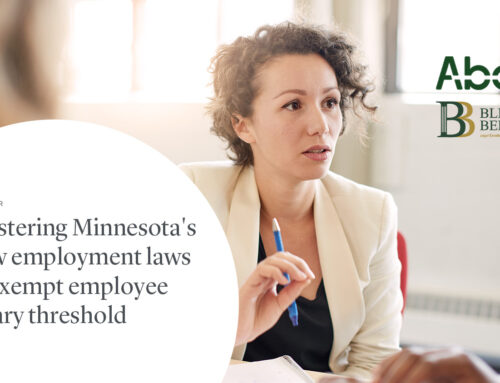Written by Mary Kay Mages
To practice law in Minnesota, a person must have and maintain a valid Minnesota law license. Practicing law without a valid license is a crime. To obtain a new Minnesota law license, a person must do the following:
- be at least 18 years old;
- graduate from an accredited law school;
- obtain a satisfactory score on the multi-state professional responsibility examination (the MPRE—an ethics exam common to all states);
- obtain a passing score on the Minnesota Bar Examination; and
- possess “good character and fitness” as determined by the Minnesota Board of Law Examiners.
“Good character and fitness” means traits, including honesty, trustworthiness, diligence and reliability, that are relevant to and have a rational connection with the license applicant’s present fitness to practice law. There are different rules for attorneys already licensed in other states and hoping to also become licensed in Minnesota. To maintain a law license Minnesota lawyers must complete 45 approved continuing legal education credit hours every 3 years, including at least 3 ethics credit hours and 2 elimination of bias credit hours, and retain their good character and fitness to practice law.
Those are the legal qualifications. But It is also helpful to think about what makes a good lawyer, and whether or not being a lawyer is a good fit for you. The ability to craft a good argument and not back down from a fight are often thought of as key characteristics to being a good lawyer. But that is only part of it, and not even the main part.
- Good lawyers are lifelong learners. Laws and rules change, and every client’s situation is nuanced and different. Lawyers know how to learn new things and apply the law to new fact patterns.
- Good lawyers write clearly. Lawyers write internal legal memoranda for colleagues, memoranda and briefs for the court, persuasive letters to other lawyers, and explanatory letters to clients. Each of these writing opportunities requires a different style, but the ability to write clearly is essential to each of them.
- Good lawyers spot issues and exercise good judgment. This is probably what people mean when saying someone is a “good arguer”. Lawyers need to identify strengths and weaknesses of various positions and then act accordingly. But it doesn’t always require an argument; more often it is a matter of working thing out at the right time and in the right way. Some of this ability is innate. But a lot of it comes with experience.
- Good lawyers interact positively with others. Clients. Staff. Court personnel. Other Attorneys. Community members. A lawyer’s habits and reputation with each of these groups will affect the lawyer’s practice and the ability to achieve positive results for clients.
- Good lawyers figure out how to stay organized. Managing files, an office, a calendar, deadlines, and a personal life is a bigger part of being a lawyer than many people realize. Knowing how to work effectively with staff and third-party vendors to keep everything running can be the difference between an ordinary lawyer and a good lawyer.
Does any of this resonate or sound interesting to you? Consider becoming a lawyer! Being a lawyer is a desirable career, especially in greater Minnesota. It is an especially good career path for students who love to learn and like to write. There is plenty of challenging and interesting legal work to be done in greater Minnesota and there is a great need for good lawyers to do it.


